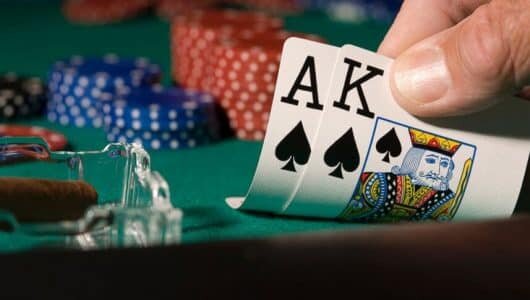Odds and Outs – Dave Tarbet
A bit of a maths lesson for you this week as we look at calculating your outs and pot odds, but please no calculators! The number of outs you have are the remaining cards in the deck with which you can win the hand. So suppose you have a flush draw on the flop in texas hold’em you would calculate your chance of hitting your flush on the next card in the following way:
You know 5 cards – the 2 in your hand and the 3 on the flop – leaving 47 unseen cards. You have 2 cards of your flush draw in your hand and another 2 on the flop which leaves 9 cards left in the deck that can make your flush. (There are 13 cards in each suit.) Therefore out of the remaining 47 cards, 9 will make your flush and 36 will not, so the odds are 36 to 9 which equates to 4 to 1 or 20%.
So know you know the odds of making your flush we must look at what odds the pot is offering us to determine if it is correct or not to continue with the hand. Let’s say that there is $100 in the pot and your opponent bets $25. You work out the pot odds in the following way:
After your opponent bets $25 there is $125 in the pot and it’s costing you $25 to call. Therefore you are getting 5 to 1 pot odds for your 4 to 1 flush draw which is a good deal and you should call. However, if your opponent bets $100 instead of $25 into the $100 pot you are now only getting 2 to 1 pot odds for your flush draw which now makes it incorrect to call. To add a further level of thinking, it is sometimes correct to call when not getting the right pot odds because of implied odds.
Implied odds take into account the future money that you could win if you make your hand. Let’s take the same $100 pot and $100 bet from your opponent as above and suppose your opponent has a few hundred remaining. Now if you think you can get your opponent to call say $300 if you hit your card on the next betting round then the implied odds are 5 to 1. However, if your opponent doesn’t have any more chips left then you can’t win any more from him if you make your hand so there are no implied odds.
This has just been a very basic introduction to odds and outs. If you want to learn more about this subject I recommend reading a text by either David Sklansky or Mason Malmuth who are two of the foremost theoretical thinkers about the game today.



